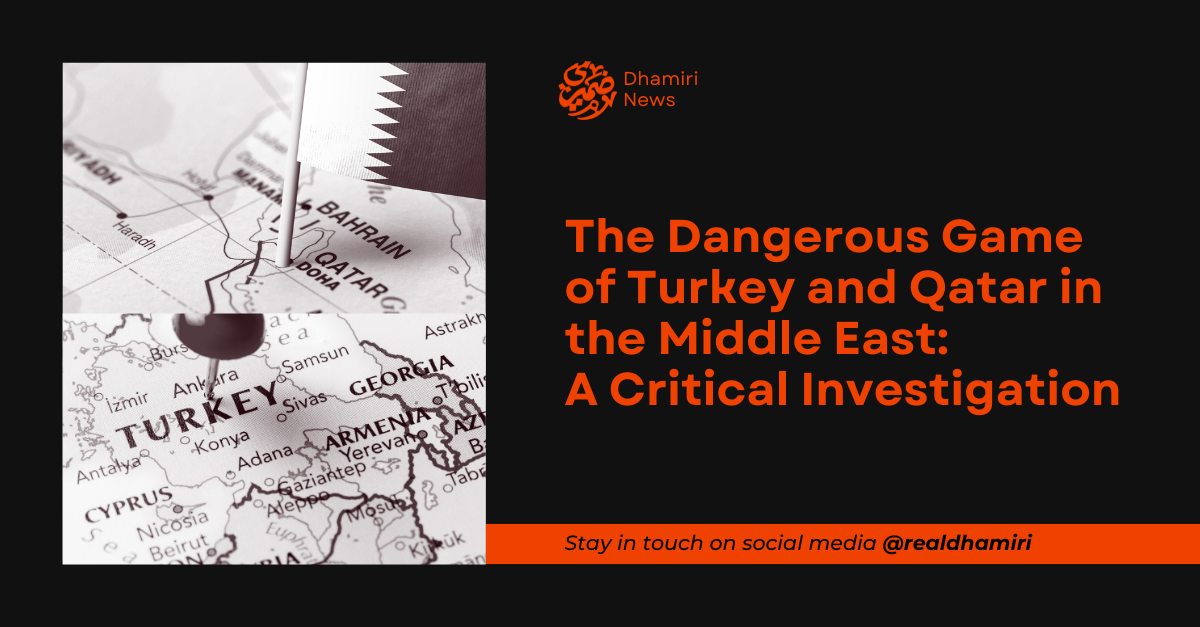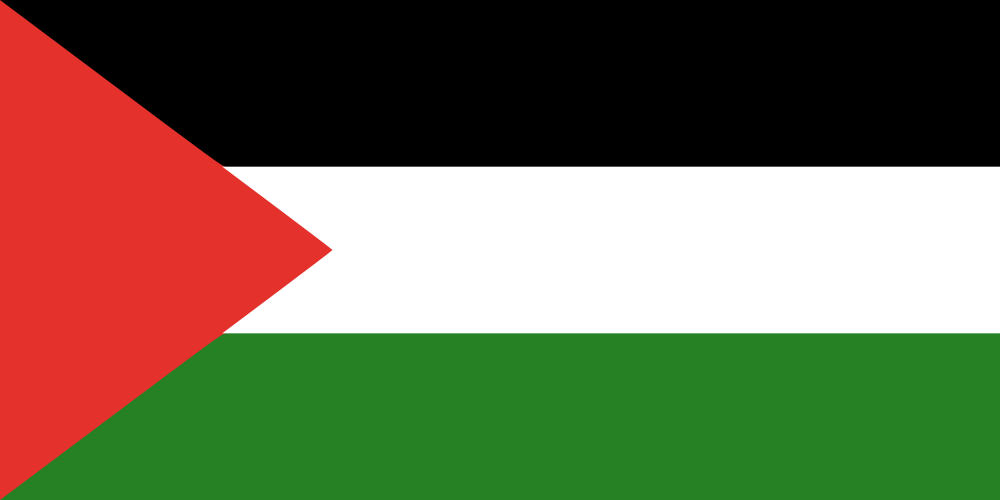The Dangerous Game of Turkey and Qatar in the Middle East: A Critical Investigation

The Dangerous Game of Turkey and Qatar in the Middle East: A Critical Investigation
In the volatile and complex geopolitical landscape of the Middle East, the struggle for Palestinian liberation and regional sovereignty has long been a focal point of conflict. Lebanon, Palestine, and Syria are at the heart of this struggle, with their peoples facing occupation, displacement, and oppression. While many in the Arab world look to Turkey and Qatar for support in this battle against Zionism and imperialism, a deeper investigation into their foreign policies reveals troubling contradictions. These countries, despite their vocal support for Palestine, are playing dangerous double games that ultimately undermine the very resistance they claim to support.
This article seeks to critically examine the roles of Turkey and Qatar in the region, especially their involvement in Syria and their support for extremist groups that weaken the resistance axis. By understanding the full scope of their actions, it becomes clear that these nations are not the saviors they are often portrayed as, and their involvement could, in fact, be hindering the true liberation of Palestine and the Arab world.
1. The Illusion of Support: Turkey’s Role in the Middle East
Turkey, under President Recep Tayyip Erdogan, has positioned itself as a vocal critic of Israel and a supporter of Palestinian resistance. However, a closer look at Turkey’s foreign policy and its actions in Syria, Lebanon, and Palestine exposes a much more complex reality.
Turkey’s Rhetoric vs. Its Actions
Erdogan frequently condemns Israeli aggression and expresses solidarity with the Palestinian cause, particularly in Gaza. He has openly criticized Israel’s policies and has offered rhetorical support to Hamas, the Palestinian Islamist group. However, while Turkey's public stance may seem to align with Palestinian interests, its actions tell a different story.
Turkey has been a major player in the Syrian conflict, where it has supported a variety of rebel groups, including some that have links to extremist factions such as Hayat Tahrir al-Sham (HTS) and the Nusra Front. These groups have frequently clashed with Hezbollah, a key player in the axis of resistance, which includes Syria, Iran, and Lebanon. By backing these rebel groups, Turkey weakens the broader resistance efforts that are actively fighting Israeli aggression. Additionally, Turkey’s support for these factions creates sectarian tensions that serve to divide Arab unity, a crucial element for any meaningful resistance against Zionism.
Turkey’s Proxy War: A Strategy for Regional Expansion
Turkey’s military involvement in northern Syria and its backing of extremist groups also serve its broader geopolitical interests. Erdogan’s government has been accused of using these proxy forces to establish a sphere of influence in Syria, often at odds with the Syrian government and its allies, including Hezbollah and Iran. This destabilization of Syria, while framed as a counter to Kurdish forces, also serves to divide the Arab world and weaken the resistance axis.
Furthermore, Turkey has engaged in military operations in Libya, further demonstrating its intent to expand its regional influence. These actions are not just about the Kurdish issue; they are about Turkey positioning itself as a regional power capable of shaping the future of the Middle East. In doing so, Turkey’s actions weaken the resistance forces that could otherwise unite to resist the Israeli occupation of Palestine.
Secret Deals with Israel: The Betrayal of Palestine
One of the most telling contradictions in Turkey’s foreign policy is its relationship with Israel. Despite Erdogan’s vocal condemnation of Israeli policies, reports have surfaced suggesting that Turkey and Israel have engaged in secretive energy deals and military cooperation. In the Eastern Mediterranean, where both countries have competing interests in natural gas exploration, Israel and Turkey have found common ground. This economic cooperation undermines Turkey's supposed support for Palestinian liberation. If Turkey were truly committed to Palestinian sovereignty, it would not align itself with the very state that oppresses them.
2. Qatar’s Double Game: Financial Support for Extremism and Media Manipulation
Qatar, like Turkey, has positioned itself as a key supporter of Palestinian resistance. However, its actions paint a more troubling picture. Qatar’s foreign policy is characterized by both support for Hamas and its financial backing of extremist factions that destabilize the region, including in Syria, Libya, and Yemen.
Qatar’s Funding of Extremist Groups
Qatar has been accused of funneling billions of dollars into extremist groups, some of which are aligned with Al-Qaeda and ISIS affiliates. In Syria, Qatar supported groups like the Nusra Front and other jihadist factions, which sought to overthrow the Syrian government. These groups not only destabilized Syria but also contributed to the sectarian conflict that has torn the region apart. Qatar’s funding of these groups played a crucial role in the rise of extremism in Syria, undermining the Syrian government's ability to resist both the Western-backed opposition and Israeli interference.
In addition to Syria, Qatar’s support for extremist factions in Libya and Yemen has fueled instability across the region. By funding these groups, Qatar has played a significant role in creating the chaos that allows Israel and its allies to further their agenda in the Middle East.
Qatar’s Media Empire: A Weapon for Dividing the Arab World
Qatar’s media influence, particularly through its flagship channel Al Jazeera, has been a key tool in shaping public opinion in the Arab world. Al Jazeera has garnered praise for its coverage of the Arab Spring and its criticism of Western imperialism. However, its reporting on issues like Syria and Hezbollah has been criticized for promoting a narrative that undermines the resistance axis. Qatar’s media empire has been accused of delegitimizing groups like Hezbollah, which are at the forefront of the fight against Zionism and imperialism.
By portraying Hezbollah and other resistance groups as sectarian or extremist, Qatar’s media attempts to divide the Arab world and create rifts between Sunni and Shia populations. This serves the broader geopolitical interests of Qatar, which seeks to position itself as a mediator in the region while simultaneously working against the forces that are actually fighting for Palestinian liberation.
3. The True Axis of Resistance: Lebanon, Palestine, and Syria
The true resistance to Zionism and imperialism does not lie in the hands of Turkey or Qatar. It lies with the people of Lebanon, Palestine, and Syria, who have borne the brunt of Israeli aggression and occupation for decades.
Lebanon: The Heart of the Resistance
Lebanon, and particularly Hezbollah, has been at the forefront of the fight against Israeli occupation. Hezbollah, with its strong ties to Syria and Iran, has repeatedly resisted Israeli incursions into Lebanon and has been a crucial player in the broader axis of resistance. Hezbollah’s victory in the 2006 war against Israel demonstrated its capability to stand against Zionism, and it continues to support Palestinian groups fighting for liberation.
Lebanon’s role in this struggle cannot be overstated. The Lebanese people have endured Israeli aggression for decades, and their commitment to the Palestinian cause is unwavering. Hezbollah’s support for Palestinian groups like Hamas and Islamic Jihad is not just rhetorical — it is concrete, with military, financial, and logistical support.
Palestine: The Heart of the Struggle
The Palestinian people have been at the heart of the resistance to Israeli occupation since 1948. From the early days of the Palestinian Liberation Organization (PLO) to the rise of Hamas and Islamic Jihad, Palestinian resistance has been a symbol of defiance against Zionism. While external support is crucial, it is the Palestinian people themselves who are the true leaders of this struggle.
The international community must recognize that Palestinian liberation is not about opportunistic players like Turkey and Qatar trying to manipulate the situation for their own gain. It is about the Palestinian people’s right to self-determination and the end of Israeli apartheid.
Conclusion: A Call for Unity and True Resistance
Turkey and Qatar, despite their public rhetoric, are playing a dangerous double game in the Middle East. Their support for extremist factions, their sectarian policies, and their covert dealings with Israel undermine the true resistance to Zionism. The Arab world must recognize that the path to Palestinian liberation lies not in the hands of these opportunistic powers but in the hands of the true resistance forces — Lebanon, Syria, and Palestine.
The people of the Arab world must reject the false promises of Turkey and Qatar and instead support the true forces of resistance that have been fighting for Palestinian liberation for decades. Lebanon, Syria, and Palestine must remain at the forefront of this struggle, and the Arab world must unite to confront the forces of occupation and imperialism. Only then can the dream of a free and independent Palestine become a reality.
The people of the Middle East deserve leaders who will truly fight for their sovereignty and dignity, not those who play games for their own political and economic gain. It is time for the Arab world to awaken to the reality of Turkey and Qatar’s involvement in the region and to support the true resistance movements that are committed to ending Israeli occupation and imperialism. Only through unity, resistance, and the unwavering commitment to Palestinian liberation can the forces of Zionism and imperialism be defeated.
Sources
1. Turkey’s Role in the Middle East and Its Relationship with Zionism
Turkey's foreign policy under President Erdoğan has been controversial, swinging between antagonism and cooperation with Israel. While Erdoğan has positioned himself as a critic of Israeli policies, especially regarding Palestine, Turkey's increasing economic and political ties with Israel contradict its anti-Zionist rhetoric. Notably, in 2020, Erdoğan normalized relations with Israel, despite his earlier rhetoric condemning Israeli policies and speaking in favor of Palestinian rights.
- Sources:
- "Turkey-Israel Relations: A Rocky Path to Peace" – Al Jazeera
- "Turkey’s relations with Israel: A love-hate relationship" – BBC News
2. Qatar’s Support for Terrorist Groups and Its Media Influence
Qatar's financial and diplomatic support for various groups in the Middle East, including factions such as HTS (Hayat Tahrir al-Sham) and the Nusra Front, has been widely discussed. While Qatar has been vocal in supporting Palestinian rights, it has also been accused of funding groups that destabilize the region and undermine the Axis of Resistance. Qatar's media influence through outlets like Al Jazeera plays a crucial role in shaping perceptions, often promoting a narrative that aligns with its own geopolitical interests.
- Sources:
- "Qatar’s Support of Terrorist Organizations: An Examination of Policy" – Middle East Eye
- "Qatar: The role of Al Jazeera and its links to extremist factions" – The Guardian
- "Qatar’s Double Game in Syria and Its Implications" – The Atlantic
3. The Axis of Resistance and Its Role in Supporting Palestine
The Axis of Resistance, comprising Iran, Hezbollah, and Syria, has long been a major force in confronting Israeli aggression and defending Palestinian rights. While these entities are often portrayed as opposition to Western-backed regimes in the region, they also provide tangible military and financial support to Palestinian factions and contribute to regional stability. However, the support of these groups has often been overshadowed by the involvement of external actors like Qatar and Turkey, who sometimes collaborate with groups that destabilize the region.
- Sources:
- "The Axis of Resistance: A strategic and ideological coalition" – The Institute for National Security Studies (INSS)
- "The Role of Hezbollah and Iran in the Middle East" – Council on Foreign Relations
4. The Popularity of Turkish TV Shows in the Arab World
While Turkey’s political actions are often met with suspicion in the Arab world, its entertainment industry has enjoyed massive success, with Turkish TV dramas like Diriliş: Ertuğrul becoming cultural phenomena. This paradox highlights the contradictions in the region, where millions admire Turkish culture yet may find its political policies troubling, especially regarding the Palestinian cause and relations with Israel.
- Sources:
- "Turkey’s TV Exports to the Arab World: The Rise of Turkish Soap Operas" – Al Monitor
- "Arab World’s Love Affair with Turkish TV Shows" – The National
5. Turkey’s Proxy Involvement in Syria and Lebanon
Turkey’s involvement in Syria has involved supporting rebel factions and participating in the conflict, particularly against the Syrian government and its allies, such as Hezbollah. This involvement serves to weaken the Axis of Resistance and indirectly supports Israeli objectives by creating instability in the region. Additionally, Turkey’s use of jihadist proxies raises concerns about its role in regional power plays and the destabilization of countries like Lebanon and Syria.
- Sources:
- "Turkey’s Involvement in Syria: A Complex Battle for Power" – The Washington Institute
- "How Turkey's 'Soft Power' Works in the Middle East" – Foreign Policy
6. Qatar’s Double Game in the Middle East
Qatar’s role as a mediator and benefactor for multiple regional conflicts is often marked by its double game. While publicly supporting Palestinian rights, Qatar also funds groups that destabilize the region, including terrorist factions in Syria. This contradiction undermines the legitimacy of its support for Palestine and complicates its relations with other Arab nations. The media, especially Al Jazeera, plays a significant role in shaping public perception, often framing Qatar’s actions in a favorable light despite its controversial policies.
- Sources:
- "The Double Game of Qatar: Support for Rebels and the West" – Al Jazeera
- "Qatar’s Role in the Middle East Crisis" – The New York Times
7. Zionist Influence and the U.S. Role in the Middle East
The United States' unyielding support for Israel has been one of the key factors in the perpetuation of the Palestinian struggle. While the U.S. has framed itself as a mediator in the Middle East, its policies often favor Israel, making any meaningful progress on the Palestinian issue unlikely. The influence of Zionist interests in U.S. foreign policy has resulted in policies that undermine the sovereignty of Arab nations and perpetuate the region's instability.
- Sources:
- "US-Israel Relations: A Special Bond" – The Washington Post
- "The U.S. Role in the Middle East: A Historical Perspective" – Brookings Institution
Written By Dhamiri
December 2024



